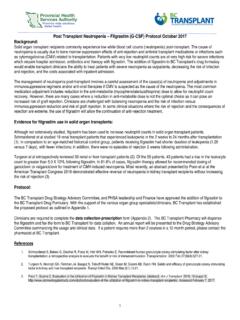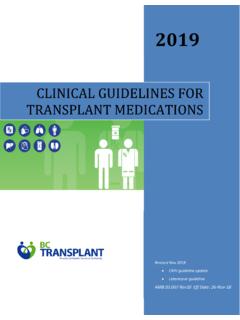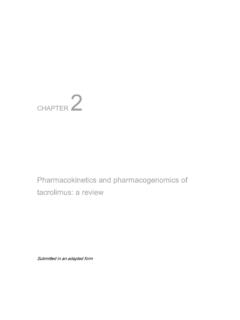Transcription of MEDICATION GUIDELINES FOR SOLID ORGAN TRANSPLANTS
1 2019 Revised Nov 2018 CMV guideline update Letermovir guideline Rev10 Eff Date: 26-Nov-18 CLINICAL GUIDELINES FOR TRANSPLANT MEDICATIONS _____ Table of Contents Page 1. Introduction 3 2. Azathioprine 5 3. Basiliximab 8 4. Cyclosporine 13 5. Darbepoetin Alpha/Erythropoietin 25 6. Filgrastim (G-CSF) 30 7. Hepatitis B Antiviral Agents: Lamivudine , Adefovir, Entecavir and Tenofovir 33 8. Letermovir 44 9. Mycophenolic Acids: Mycophenolate Mofetil and Mycophenolate Sodium 47 10. Prednisone 56 11. Sirolimus 61 12. tacrolimus 75 13.
2 Valganciclovir 86 14. Appendices 100 Page 2 of 103 _____ 1. Introduction Patients who undergo SOLID ORGAN transplant require lifelong immunosuppression to prevent ORGAN rejection. In ORGAN transplantation, the ideal form of immunosuppression is to induce donor specific tolerance without impairing the host defences or increasing the susceptibility to infection from all types of organisms. The most common immunosuppressants prescribed for SOLID ORGAN transplant recipients are: Each of these drugs has its own adverse effect and toxicity profile that may result in serious morbidity or mortality.
3 Careful management of these complications by the patient and the transplant team is critical to transplant success. BC Transplant funds the following outpatient immunosuppressants for SOLID ORGAN and pancreatic islet cell transplant recipients who have BC Medical Services Plan coverage and are registered with BC Transplant, when the GUIDELINES are followed: Outpatient Immunosuppression: Calcineurin Inhibitors: Cyclosporine tacrolimus IMMEDIATE Release tacrolimus EXTENDED Release Mycophenolic Acids: Mycophenolate Mofetil Mycophenolate Sodium Azathioprine Sirolimus Prednisone Calcineurin Inhibitors.
4 Cyclosporine tacrolimus Mycophenolic Acids: Mycophenolate Mofetil Mycophenolate Sodium Azathioprine Sirolimus Prednisone Basiliximab Anti-thymocyte Globulin Clinical GUIDELINES for Transplant Medications Page 3 of 106 _____ Inpatient Immunosuppression BC Transplant funds the inpatient immunosuppressant basiliximab and entanercept for pancreatic islet cell transplant when the GUIDELINES are followed. Special Outpatient Medications Required to Maintain Transplant In addition to immunosuppressants, SOLID ORGAN transplant recipients often require other outpatient medications which are needed to maintain the integrity of the transplant and are very important in a patients MEDICATION regimen.
5 BC Transplant covers the cost of the following medications if the GUIDELINES are met: Erythropoiesis - Stimulating Agents: Erythropoietin Darbepoetin Anti-Viral Agents: Valganciclovir Lamivudine Adefovir Tenofovir Entecavir Leflunomide Clinical GUIDELINES for Transplant Medications Page 4 of 106 _____ 2. Azathioprine INTRODUCTION Azathioprine is an immunosuppressant antimetabolite that belongs to the thiopurine drug class and may be used in combination protocols. In the past azathioprine was used routinely for maintenance therapy to prevent rejection following SOLID ORGAN transplantation.
6 Azathioprine is no longer used routinely in post-transplant immunosuppression protocols but may be used in certain circumstances. MECHANISM OF ACTION Azathioprine is a purine analog that is incorporated into cellular DNA, where it inhibits purine nucleotide synthesis and interferes with the synthesis and metabolism of RNA. PHARMACOKINETICS Azathioprine is well absorbed from the gastrointestinal tract. Azathioprine is a prodrug for mercaptopurine. The thiopurine S-methytransferase (TPMT) is involved in the metabolism of all thiopurines and is one of the main enzymes that inactivates mercaptopurine.
7 Azathioprine is primarily metabolized to two active metabolites: 6-mercatopurine and 6-thionosinic acid. Only one to two percent of the drug is eliminated unchanged by the kidneys. THERAPEUTIC USE Azathioprine may be used as maintenance therapy in conjunction with other immunosuppressive agents to prevent ORGAN transplant rejection in patients who are unable to tolerate the gastrointestinal effects of mycophenolic acids, have an increased incidence of infection while on mycophenolic acids or in female transplant recipients who are considering pregnancy.
8 Prior to initiating azathioprine therapy it is recommended thiopurine S-methyltransferase (TPMT) genotyping be determined. This allows for patients at increased risk for myleosuppression to be identified, for starting dose of azathioprine to be reduced, or an alternative therapy to be prescribed. TPMT testing must receive Health Insurance of BC approval. Refer to LifeLabs website Kidney and Kidney/Pancreas Transplant Recipients Physicians must consult the patient s primary transplant centre if azathioprine is being considered.
9 Azathioprine may be used in patients who cannot tolerate the gastrointestinal toxicity of mycophenolate mofetil, have an increased incidence of infection while on mycophenolate mofetil, or in female transplant recipients who are considering pregnancy. Azathioprine is not a preferred immunosuppressant in a patient who is on a steroid-free protocol. Lung Transplant Recipients Mycophenolate mofetil has replaced azathioprine post-transplant. There are some patients currently receiving azathioprine who have an intolerance to mycophenolate.
10 If patients are stable on azathioprine there is no benefit to switching them to mycophenolate mofetil. Clinical GUIDELINES for Transplant Medications Page 5 of 106 _____ Heart Transplant Recipients Mycophenolate mofetil has replaced azathioprine post-transplant. There are some patients currently receiving azathioprine who have an intolerance to mycophenolate. If patients are stable on azathioprine there is no benefit to switching them to mycophenolate mofetil. Liver Transplant Recipients TPMT genotyping will not be done in liver transplant recipients.


